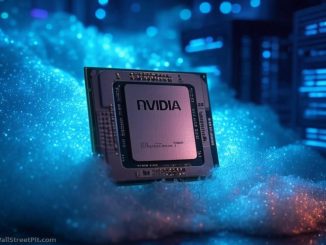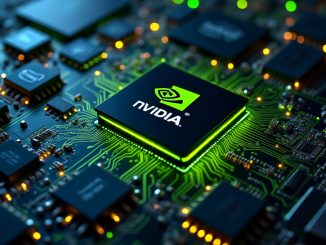
Nvidia’s (NVDA) stock performance in 2024 has been nothing short of spectacular, mirroring the company’s pivotal role in the burgeoning field of artificial intelligence (AI) with its groundbreaking GPU, Blackwell. This chip, named Yahoo Finance’s 2024 Product of the Year, has significantly influenced Nvidia’s stock, propelling it towards another triple-digit percentage gain after a nearly 240% surge in 2023.
Blackwell is not just another GPU; it’s a technological leap forward, combining two dies into one chip to offer unmatched power and efficiency. This innovation has made it particularly appealing to hyperscalers like Alphabet (GOOG, GOOGL) and Microsoft (MSFT), who are aggressively expanding their data centers to support large language models (LLMs). The chip’s design includes 208 billion transistors, a dramatic increase from its predecessor, Hopper, offering up to a 30x performance boost for LLM inference workloads while consuming significantly less energy.
The demand for Blackwell has been fueled by the U.S. business sector’s increasing investment in generative AI, which according to a YF report, has seen spending jump from $2.3 billion in 2023 to $13.8 billion in 2024. Nvidia’s ability to capitalize on this trend has been evident, with KeyBanc analyst John Vinh estimating Blackwell will contribute between $4 billion and $5 billion in sales this quarter alone. This demand has obviously given Nvidia considerable pricing power, as companies see Nvidia’s solutions as indispensable for their AI ambitions. In an early October interview with CNBC, CEO Jensen Huang characterized the demand for the Blackwell chip as “insane.” Huang noted, “Everybody wants the most, and everybody wants to be first.”
However, Nvidia’s dominance in the AI chip market isn’t without its challenges. Its stock has experienced a 15% pullback from its previous $130.39 close since hitting a 52-wkh/$152.89, amid rising competition and broader market dynamics. Competitors like Advanced Micros Devices (AMD) and Amazon (AMZN) are pushing their own AI chip solutions, raising questions about how long Nvidia can maintain its lead. Yet, Nvidia’s current market share for AI chips used in training models, estimated to be between 70% to 95%, suggests a robust position, albeit with potential vulnerabilities in the inference phase where competition might intensify due to lower power requirements and cost considerations.
Nvidia’s valuation, while high, remains competitive within the industry, with a forward P/E ratio of 30.6, compared to peers like Marvel Technologies (MRVL) and Broadcom (AVGO), 41.5 and 38.3 respectively. This valuation reflects investor confidence in Nvidia’s continuous innovation and market strategy, despite the looming supply chain challenges that have slightly delayed Blackwell’s full-scale production. CEO Jensen Huang has emphasized that while production is ramping up, demand will outstrip supply for several quarters, underscoring the chip’s market reception and Nvidia’s strategic position.
Looking ahead, Nvidia’s growth projections indicate a slowdown, with Mizuho’s Jordan Klein attributing it to the “law of large numbers.” According to analysts surveyed by Bloomberg, sales growth is expected to decline from 126% in 2023 to 52% in 2024. However, this is not seen as a cause for concern but rather a normalization after an extraordinary period of growth. The continued demand for Nvidia’s products, particularly in AI applications, supports a positive outlook for the company’s stock, even as the tech landscape becomes increasingly competitive.
Price Action: Nvidia shares were up $3.75, or 2.8%, trading at $134.14 at last check. This surge brings NVDA’s year-to-date gains to an impressive 163%.
- Bulenox: Get 45% to 91% OFF ... Use Discount Code: UNO
- Risk Our Money Not Yours | Get 50% to 90% OFF ... Use Discount Code: MMBVBKSM
Disclaimer: This page contains affiliate links. If you choose to make a purchase after clicking a link, we may receive a commission at no additional cost to you. Thank you for your support!





Leave a Reply